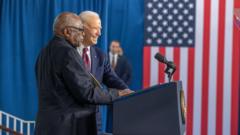In recent gatherings, the Democratic Party has begun confronting a critical issue: the prominence of older politicians within its ranks. The "world famous fish fry" hosted by Congressman Jim Clyburn in South Carolina, a longstanding fixture for political networking, has raised questions about whether it’s time for the party to embrace new traditions alongside its aging old guard.
For over three decades, Clyburn, 84, has played an influential role in the party, endorsing established figures like Joe Biden, who is now 82. However, Biden's recent health concerns, including a stage 4 prostate cancer diagnosis, have reignited debates about the viability of an elderly leadership in a rapidly shifting political landscape. Biden’s situation has many within the party calling for a younger wave of politicians to take the helm, particularly after recent losses in Congress due to aging members' passings.
Ashley McIntyre Stewart, echoing sentiments at Clyburn's event, stated, "We have a geriatric problem," emphasizing the need to engage younger voices to counter Republican maneuvering in Congress. Despite this, a significant portion of the older Democratic members express their intentions to run for re-election, including Clyburn, who dismisses notions of retirement based on voter feedback.
Democratic voters have historically valued the experience of older representatives but the pressures from recent electoral defeats are prompting a shift in thinking. Only two incumbents under 50 lost their nominations in the past year, underscoring a challenge for the party to adapt while holding onto experienced leadership.
Amid these discussions, signs of emerging young leaders such as Saikat Chakrabarti and Jake Rakov indicate a possible generational shift in the party. Many Democratic activists are clamoring for a convergence of innovative ideas fueled by diverse experiences, as reflected in insights shared by attendees at the fish fry.
Democratic governors Tim Walz and Wes Moore also weighed in, highlighting the importance of rejuvenating the party to its former glory after recent setbacks. They recognize the imperative of attracting younger demographics to resonate with voters looking for rejuvenated energy in campaigns leading to 2024.
As South Carolina prepares to play a pivotal role in the next presidential nominations, the dialogue around age in leadership is critical. The manner in which the Democratic Party balances the advantages of experience with the vitality of youth will be key in navigating future electoral challenges and restoring faith in their governance.
For over three decades, Clyburn, 84, has played an influential role in the party, endorsing established figures like Joe Biden, who is now 82. However, Biden's recent health concerns, including a stage 4 prostate cancer diagnosis, have reignited debates about the viability of an elderly leadership in a rapidly shifting political landscape. Biden’s situation has many within the party calling for a younger wave of politicians to take the helm, particularly after recent losses in Congress due to aging members' passings.
Ashley McIntyre Stewart, echoing sentiments at Clyburn's event, stated, "We have a geriatric problem," emphasizing the need to engage younger voices to counter Republican maneuvering in Congress. Despite this, a significant portion of the older Democratic members express their intentions to run for re-election, including Clyburn, who dismisses notions of retirement based on voter feedback.
Democratic voters have historically valued the experience of older representatives but the pressures from recent electoral defeats are prompting a shift in thinking. Only two incumbents under 50 lost their nominations in the past year, underscoring a challenge for the party to adapt while holding onto experienced leadership.
Amid these discussions, signs of emerging young leaders such as Saikat Chakrabarti and Jake Rakov indicate a possible generational shift in the party. Many Democratic activists are clamoring for a convergence of innovative ideas fueled by diverse experiences, as reflected in insights shared by attendees at the fish fry.
Democratic governors Tim Walz and Wes Moore also weighed in, highlighting the importance of rejuvenating the party to its former glory after recent setbacks. They recognize the imperative of attracting younger demographics to resonate with voters looking for rejuvenated energy in campaigns leading to 2024.
As South Carolina prepares to play a pivotal role in the next presidential nominations, the dialogue around age in leadership is critical. The manner in which the Democratic Party balances the advantages of experience with the vitality of youth will be key in navigating future electoral challenges and restoring faith in their governance.





















